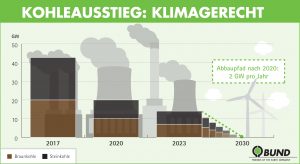
Berlin: On 4 May 2018, BUND presented a shutdown plan for nuclear power plants (NPPs) and coal-fired power plants. This analysis shows that the decommissioning of the most climate-damaging coal-fired power plants by 2020 and a significant acceleration of the nuclear phase-out in Germany are possible without jeopardising security of supply. "The shutdown plan is a call to action for the political actors to finally take action," explains BUND Chair Hubert Weiger at the presentation of the shutdown plan in Berlin.
In the shutdown plan, BUND has drawn up a concrete performance balance and names power plants as well as annual figures for the shutdown. The focus is on the years 2020 and 2023. This period is considered to be a particular challenge for supply security, since on the one hand it is the legal date for the phase-out of nuclear power. On the other hand, a good half of the coal-fired power plants must be taken off the grid in order to achieve the German climate target for 2020.
The BUND shutdown plan shows that this is possible and that significantly more coal-fired power plants can be taken off the grid in the short term than has been discussed so far, and that this can also be combined with a significant acceleration of the nuclear phase-out. As a result, the power surplus in Germany is declining, but the supply remains guaranteed even in hours without sun and with little wind. "In the first quarter of 2018, Germany exported on average the electricity production of five large power plants. Against this background alone, it is surprising that the new federal government has not agreed on the short-term decommissioning of the most climate-damaging coal-fired power plants," says the BUND chairman. "We want to show with our analysis that much more is possible if the political will is there."
The BUND shutdown plan shows that security of supply can be ensured if politicians do not continue to wait, but actively promote the energy transition in parallel to the shutdowns. The calculations of the power balance are mainly based on values from, for example, the Federal Network Agency or the transmission system operators. Deviations and other assumptions are justified. "With our analysis, we want to provide an important impetus for a transparent debate within the framework of the amendment to the Atomic Energy Act and the coal phase-out commission that is being constituted," explains Weiger.
In a shutdown list for coal-fired power plants, BUND proposes the units that would have to be taken off the grid first in order to achieve the 2020 climate target. It concerns all larger coal-fired power plants that were connected to the grid before 1990, in order to reduce the coal capacity on the electricity market to 20 gigawatts. As a new measure to enable a socially acceptable coal phase-out and to safeguard security of supply in extreme situations, the environmental association proposes the introduction of an additional coal phase-out reserve of six to eight gigawatts.
"The Paris Climate Agreement requires the phase-out of coal before 2030. The federal government is responsible for achieving the climate targets, it must enshrine the phase-out in law and ensure a just structural change. To achieve the 2020 climate target, it must now launch an immediate programme. Waiting any longer is irresponsible," continued the BUND chair. Due to the inactivity of climate policy in recent years, the German "climate problem" has become increasingly acute. According to the latest emission forecasts, the German climate protection target for 2020 will be missed by ten percentage points.
At the same time as the coal phase-out, the nuclear power plants can also be taken off the grid more quickly than required by law. The seven nuclear power plants that are currently still connected to the grid represent a constant safety risk for the population and must be decommissioned as soon as possible. So far, however, the federal government does not want to use the amendment to the Atomic Energy Act to really accelerate the nuclear phase-out. "BUND demands an immediate nuclear phase-out. At the very least, the current revision of the Atomic Energy Act must be used to legally prohibit further transfers of electricity volumes," says Weiger. Without this transfer, the nuclear power plants would run for a total of ten years less and the production of 300 tonnes of highly radioactive nuclear waste would be avoided.
Getting out of nuclear power and coal and still securing the energy supply - this is possible if the energy transition is driven forward. "It is a matter of further expanding renewable energies with commitment and creating the energy-economic framework conditions for an energy turnaround that is essentially based on wind energy and photovoltaics," says Weiger. This means an expansion of flexible decentralised CHP power plants, a reduction in electricity consumption, optimised utilisation of the electricity grids and a significant increase in the possibilities for load reduction.
More information
Keywords: DE-News, Renewable, Climate protection, Media, New books and studies, Environmental policy, Ecology

